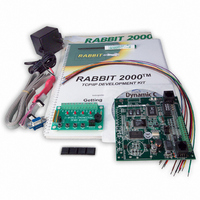101-0401 Rabbit Semiconductor, 101-0401 Datasheet - Page 52

101-0401
Manufacturer Part Number
101-0401
Description
KIT DEV RABBIT2000/TCP/IP
Manufacturer
Rabbit Semiconductor
Series
RabbitCore 2000r
Type
MPU Moduler
Datasheet
1.101-0402.pdf
(82 pages)
Specifications of 101-0401
Rohs Status
RoHS non-compliant
Contents
Rabbit 2000™ TCP/IP Development Board, Demo Board, Power Supply, Cable and Software
Processor To Be Evaluated
Rabbit 2000
Interface Type
RS-232, RS-485
For Use With/related Products
RCM2000, RCM2010, RCM2020
Lead Free Status / Rohs Status
Lead free / RoHS Compliant
Other names
101-0401
316-1005
Q906133
316-1005
Q906133
The TCP/IP Development Board comes with a 220
bias resistors installed and enabled with jumpers across pins 1–2 and 5–6 on header JP6, as
shown in Figure 8.
The bias and termination resistors in a multidrop network should only be enabled on both
end nodes of the network. Disable the termination and bias resistors on the intervening
TCP/IP Development Boards in the network by removing both jumpers from header JP6.
Note that older versions of the TCP/IP Development Board do not have this jumper fea-
ture, and the surface-mounted bias and termination resistors shown in Figure 8 have to be
removed in networks containing more than 10 TCP/IP Development Boards.
5.1.3 Programming Port
The TCP/IP Development Board has a 10-pin programming header labeled J4. The pro-
gramming port uses the Rabbit 2000’s Serial Port A for communication. The Rabbit 2000
startup-mode pins (SMODE0, SMODE1) are presented to the programming port so that an
externally connected device can force the TCP/IP Development Board to start up in an
external bootstrap mode.
The programming port is used to start the TCP/IP Development Board in a mode where
the TCP/IP Development Board will download a program from the port and then execute
the program. The programming port transmits information to and from a PC while a pro-
gram is being debugged.
The TCP/IP Development Board can be reset from the programming port.
The Rabbit 2000 status pin is also presented to the programming port. The status pin is an
output that can be used to send a general digital signal.
48
NOTE: Refer to the Rabbit 2000 Microprocessor User’s Manual for more information
related to the bootstrap mode.
W
W
W
Figure 8. RS-485 Termination and Bias Resistors
termination resistor and two 680
TCP/IP Development Kit













